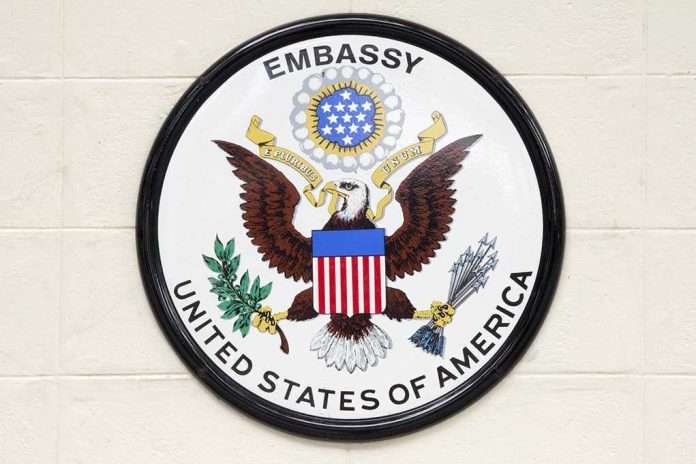
When the U.S. Embassy tells Americans to steer clear of their own government buildings in paradise, you know something far more dangerous than a tropical storm is brewing just offshore.
Story Snapshot
- A rare, explicit U.S. Embassy alert has Americans in Trinidad and Tobago on edge.
- Regional tensions spike as U.S.-Venezuela hostilities and local criminal threats converge.
- Trinidad and Tobago’s government declares a sweeping State of Emergency in response to cascading dangers.
- The risks reach far beyond embassies, shaking local stability, migration, and international business.
Security Alert Shakes American Community in Trinidad and Tobago
On October 18, 2025, the U.S. Embassy in Port of Spain issued a blunt warning: avoid all U.S. government facilities in Trinidad and Tobago. The timing was anything but random. This alert wasn’t just a routine advisory—it came as the island nation braced under a nationwide State of Emergency, while tension with Venezuela simmered just across the water. Americans in the country, from oil executives to retirees, saw the warning as a signal that the ground beneath their feet had shifted, and not for the better.
The backdrop is a potent mix of old grievances and fresh violence. The U.S. military, targeting suspected drug traffickers in Caribbean waters since September, has left a trail of casualties, some reportedly local fishermen. These operations, meant to choke off narco-networks, have instead poured fuel on anxieties about spillover violence and blowback from Venezuela—a neighbor with a long memory and a short temper for U.S. intervention. Trinidad and Tobago’s government, caught between powerful friends and dangerous neighbors, declared a State of Emergency on July 18 and extended it, hoping to contain both internal criminal threats and external chaos.
Trouble Brews: The Convergence of Crime, Migration, and Geopolitics
Trinidad and Tobago is no stranger to regional turbulence. Its mere miles of sea separate it from Venezuela, a nation wracked by turmoil and mass migration. For years, Trinidad’s coastlines have received desperate Venezuelan refugees and, with them, the shadow economy of smuggling and organized crime. The recent U.S. military strikes, however, have added a volatile new element. Local communities report missing fishermen, suspected casualties of these operations, and fear that their own government’s hands may be tied between American pressure and Venezuelan retaliation. The criminal networks thriving in this uncertainty have prompted the Trinidadian police to deploy tactical teams, yet the sense of vulnerability runs deeper than what more boots on the ground can resolve.
Officials in Trinidad and Tobago now face a dilemma. On one side stands the U.S., a powerful ally with immense economic and security leverage. On the other, Venezuela—hostile, unpredictable, and only a short boat ride away—can threaten with both official reprisal and the chaos of unchecked migration. For the average Trinidadian, the calculus is grim: every day under a State of Emergency means more disruption, more anxiety, and more fear that the next headline will bear their community’s name.
Inside the Security Response: States of Emergency and High Alert
The government’s response has been comprehensive but fraught with risk. Since July 18, Trinidad and Tobago has operated under a State of Emergency, giving law enforcement broad new powers. Parliament extended these measures for three months, and the police commissioner assures the public of increased patrols and ongoing investigations into threats against both Americans and local officials. Yet, the authorities have stopped short of imposing curfews or banning public assemblies, a calculated move to maintain calm while preserving flexibility. The U.S. Embassy’s warning, meanwhile, remains in effect, underscoring the seriousness of the threat and the uncertainty about its origins—criminal, political, or both.
For Americans and locals alike, the official messaging is clear: stay alert, avoid unnecessary risks, and be prepared for sudden changes. The absence of specific details about the threats only heightens the sense of unease. Security experts warn of the dangers of overlapping crises—when organized crime, mass migration, and geopolitical rivalry all collide in a country ill-equipped to absorb the shock. The historical memory of U.S. interventions in the Caribbean lingers, as does the knowledge that such turbulence rarely remains contained to a single shoreline.
Ripple Effects: Economic, Social, and Political Fallout
The impact of this crisis stretches far beyond embassy walls or law enforcement briefings. Trinidad and Tobago’s tourism sector, already battered by regional uncertainty, now faces cancellations and dwindling arrivals. International businesses, particularly those with American ties, weigh their own contingency plans as insurance premiums spike and supply chains wobble. The social fabric is strained as fear of violence and suspicion of outsiders rise, threatening to stoke xenophobia against the Venezuelan migrants who have fled chaos only to find new dangers. Politically, the government walks a tightrope—balancing American demands for security, the need for local stability, and the imperative to avoid provoking a larger regional conflict.
Experts see no easy solutions. Some argue that U.S. military action is necessary to disrupt the cartels and restore order, while others warn that such interventions often backfire, deepening local grievances and destabilizing fragile neighbors. For now, the only certainty is uncertainty itself. The explicit U.S. Embassy warning—the kind issued only in the gravest circumstances—signals that the risks in Trinidad and Tobago are both real and unresolved. The world will watch whether this tempest passes quietly or grows into a storm that sweeps across borders and leaves lasting scars on the Caribbean map.



